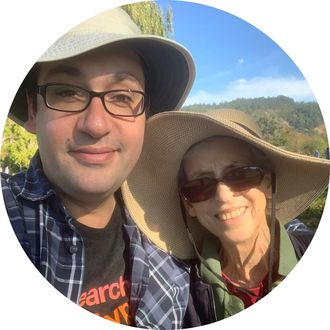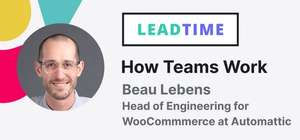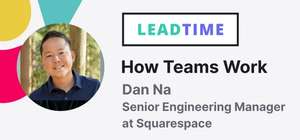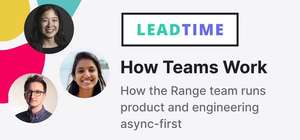
Our 12 Questions series takes you into the minds of influential leaders to discuss today’s hot topics. Read their fresh views on leadership, managing through change, and the ins and outs of modern work. Think of it as your office hours with some of the most innovative people in business.
We continue this series on resilience with Ben Werdmuller. Ben is an award-winning startup founder, venture capital investor at the intersection of media and technology, product owner, CTO, and full-stack developer. He writes prolifically about his work and loves to work on projects that allow him to draw together his diverse experience in the service of great ventures that make society more informed, empowered, and empathetic. Full interview below.

Can you describe your career in 12 words or less?
Engineer to accidental founder to impact investor to mission-driven product lead.
What does being resilient mean to you?
Work is getting faster and more intense. Our work lives are often hyperconnected, and the lines between work and life continue to blur. But we're also still human: real people with lives, commitments, and stresses outside of work.
Being resilient as a person means finding ways to intentionally set boundaries, conserve your energy, be self-aware, and meet your needs in a way that allows you to sustainably be present and effective at work and in your home life. It's partially about establishing the right rhythms and structures for you and your team, and partially about recognizing and embracing our human characteristics.
In a world where more workers are suffering from burnout than ever before, tools for stronger resiliency are vital work practices.
How has your thinking about resilience changed in 2020?
2020 has made the need for resilience more pressing for many people, myself included. We're still in the middle of a global, deadly pandemic. Many of us have had to learn to be more mindful, to find techniques for better emotional regulation, to more actively learn, and to more intentionally lead by example in our companies and communities.
At the same time, it's been made clearer to a lot more people that some communities have faced harsher challenges than others for generations. The current civil rights movement - one of the largest in the history of the world - gives me a lot of hope that we'll see real change, but there's a lot of work to do. The resiliency that truly matters is going to be found in the people that are fighting to challenge the discriminatory institutions and assumptions that underpin almost every aspect of society, in the face of stark opposition.
Companies are communities of people. Resilience at work means acknowledging that you can't separate the worker from the human. We all bring our whole selves to work, and that should include our moral compass. By tackling the human rights issues that affect the lives of members of our communities, we can build safer, more resilient workplaces.
How have you come to understand the importance of resilience in your own career?
For most of the last decade, my mother has been suffering from a terminal, genetic disease that I assumed I would eventually get too. Thankfully, a recent DNA test showed me that I wouldn't, but the battle remains for my mother and others in my family. There are certainly times when I lie awake at night, unable to let go of my anxiety. But through mindfulness, therapy, coaching, and a lot of leadership training, I've been able to show up as support for my family while making significant progress in my career and leading teams that have built products I'm proud of.
If I hadn't shown up for my family, and instead had focused on my career, I never would have been able to forgive myself. Likewise, making real progress on meaningful work has improved my well-being in a way that helped me better support the people I love. Being resilient meant taking care of my whole self, so I could take care of the people around me.
When was the last time you had to check in with yourself?
I try and check in with myself every day. Inspired by feedback grids, I like to ask myself four questions:
1. What did I do well today?
2. What could have gone better?
3. What questions do I have about the future?
4. What ideas do I have for changing how I show up?
The answers could be personal, or they could be professional. Usually, it's a mix of both.
I try to be honest with myself, but I also like to get feedback from the people I work with, using a technique inspired by Carole Robin's framework for a feedback-rich environment. It's good to be self-reflective and check in with myself, but I want to make sure that I check in with others, too. I'm certain I could be more self-aware than I am, and I want to avoid blind spots if I can.
Is there a time when you wish you were more resilient?
Frankly, always. Life is stressful; work is stressful; living in a pandemic is stressful. In our current moment, I've intentionally lowered my bar for what constitutes "showing up" - but I wish it could be higher.
What’s one big mistake you made and how did you bounce back?
At a startup earlier in my career, I made an architecture decision that made our platform noticeably slow for users. We had to scramble to fix it. I was embarrassed, but learned how to make sure I never did anything like it again.
The way to bounce back is to place the emphasis on learning, not blame. These are the questions I try to ask:
1. What actually happened, and why?
2. What would prevent it from happening again?
3. What checks can we establish to make sure that happens?
I also push back - hard - against any attempts to ascribe blame or create bad feelings for a mistake. We all make them. Environments that punish people for trying and failing will just result in fewer people trying.
What are some mistakes we all make when it comes to resilience?
Ignoring it, and pushing ourselves harder than we should at the expense of our well-being. Not only do we hurt ourselves in the process, but we become part of making a less resilient environment for others. It takes a lot more strength to maintain boundaries and look after yourself if no-one else around you is doing it.
How can people be more resilient in their work-life?
Emotions play an important role in the way we think and act. So does our physical wellness. It's important to take care of ourselves: exercise, eat well, get good sleep, and practice mindfulness. In times of extreme stress, finding the things to be grateful for is also important - otherwise we tend to over-index on our negative experiences. And finally, it's not just about ourselves: we need to promote these things in the people around us, too, and be mindful and observant about how they're doing.
We all need to look out for the whole human, not just the tiny sliver of a human that is responsible for completing tasks relevant to the work we do. And we need to take it seriously.
Vulnerability plays a critical role in building trust among teams. How much does showing humanity help in building a resilient team?
Culture is the most important thing in any team. By a mile. Your collective norms, beliefs, and practices will define how everyone acts and reacts, how safe they feel to be themselves at work, and as a direct result, how high quality the work itself is.
Showing someone that you're human gives them permission to do the same. It also gives them permission to be more honest with you; you'll get better feedback, catch issues earlier, and understand when someone is having struggles. It makes it easier to create an environment where everyone can do their best work.
Who's the most resilient person that you know? Why?
I'm inspired by all the people who have literally been fighting for equality for their entire lives. I can't begin to imagine the resiliency required to fight for the human rights of you and your community, day in, day out, with no end in sight. I wish it wasn't required.
If you could leave people with one piece of advice about how to deal with what's happening right now in the world, what would it be?
Listen to the experts, center their lived experience and expertise - and then participate. We're all part of what happens next.










